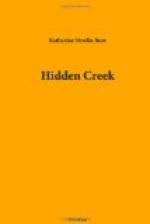There was that in his voice when he said this that touched Sheila’s heart, profoundly. This restless, violent young adventurer, homeless, foot-loose, without discipline or duty, had turned to her in his trouble as instinctively as though she had been his mother. This, because she had once served him. Something stirred in Sheila’s heart.
“And then,” Hilliard went on, “I was going to get down to Arizona. But when I heard you were coming over into Hidden Creek, it seemed like foolishness to cut myself off from the country by running away from nothing. Of course there are ways to prove my identity with those fellows. It only means putting up with a few days of pen.” He gave a sigh. “But you can understand, ma’am, that this isn’t just the horse that will give you quietest entrance into Rusty and that I’m not just one of the First Citizens.”
“But,” said Sheila, “if they see you riding in with me, they certainly won’t shoot.”
He laughed admiringly. “You’re game!” he said. “But, Miss Arundel, they’re not likely to do any more shooting. It’s not a man riding into Rusty that they’re after. It’s a man riding out of Rusty. They’ll know I’m coming to give myself up.”
“I’ll just stay here,” said Sheila firmly.
“I can’t let you.”
“I’m too tired to walk. I’m too sleepy. It’ll be all right.”
“Then I’ll walk.” He pulled in his horse, but at the instant stiffened in his saddle and wheeled about on the road. A rattle of galloping hoofs struck the ground behind them; two riders wheeled and stopped. One drew close and held out his hand.
“Say, stranger, shake,” he said. “We’ve been kickin’ up the dust to beg your pardon. We got the real rustler this mornin’ shortly after you left. I’m plumb disgusted and disheartened with young Tommins for losin’ his head an’ shootin’ off his gun. He’s a dern fool, that kid, a regular tenderfoot. Nothin’ won’t ever cure him short of growin’ up. Come from Chicago, anyway. One of them Eastern towns. I see he got you, too.”




